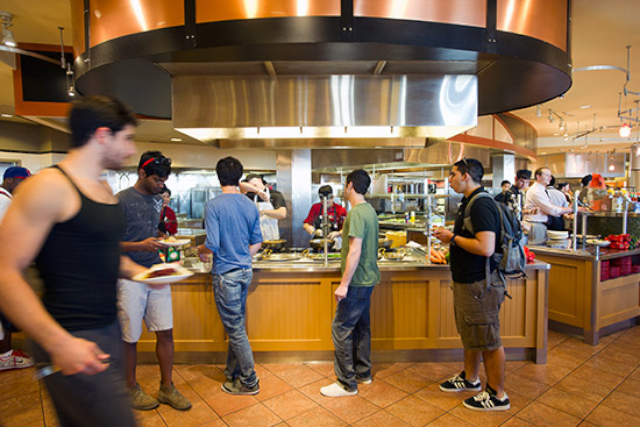We keep hearing about how important it is for kids and teens to follow a healthy diet. Now researchers say it may be just as important or more so to ensure that college-age students get a healthy diet. To ensure they age gracefully…
 Student cafeteria at Boston University offers wide variety of food options.
Student cafeteria at Boston University offers wide variety of food options.
Kids must make their own dietary choices according to
their cravings, prior experience and concenience.
So crucial is childhood diet considered that most school boards in the western world now operate school breakfast and lunch programs. Now, a team at the University of British Columbia has explored the association of healthy eating habits with future health issues including obesity, respiratory illnesses and depression.
What they did
A team of international researchers recently published a multi-site study looking at the eating habits of university students. Almost 12,000 medical students from 31 universities in China participated in the study that aimed to determine the association between eating behaviours, obesity and various diseases.
“We know many students consume high-calorie meals along with sugary foods and drinks and there is lots of evidence to show those kinds of eating behaviours can lead to obesity,” says Dr. Joan Bottorff, a Professor at UBC’s School of Nursing. “These are not the only habits that lead to obesity, but they are important and can’t be ruled out.”
The point, says Dr. Bottorff, is that many poor eating habits begin at university and can continue for decades.
What they found
According to an abstract of the study report, “A typical student diet of high-sugar or high-calorie foods can become a long-term issue as these habits can lead to obesity. Dr. Bottorff says there is evidence to show that stress and anxiety can cause overeating, but overeating can also lead to stress and depression.”
“There has been biomedical research that also supports this link between obesity and infectious diseases, and most recently this has been related to COVID-19,” Bottorff adds. “We know from some of the recent publications related to COVID-19, obese people were more likely to have severe conditions and outcomes. Reasons that have been offered for this increased vulnerability include impaired breathing from the pressure of extra weight and poorer inflammatory and immune responses.”
The takeaway
“The bottom line here is that we shouldn’t be ignoring this risk pattern among young people at university. It is well documented that a significant portion of students have unhealthy diets,” Bottorff adds. Dr. Bottorff says students should be taught about healthy eating while at university. And – as with elementary and secondary schools – the onus should be on the school to provide healthy, and affordable, food options for all students.
“We need to think about the food environment that we provide students. We need to ensure that in our cafeterias and vending machines, there are healthy food options so that they can eat on the go but also make healthy food choices.”
My take
It just makes sense that students – once out on their own, and detached from the organized eating patterns of their childhoods and teens – would devolve in their eating habits to what’s in their nature: grab-and-go, choose what caters to their hard-wired cravings (fat, salt and sugar) and cave in to convenience.
This new study, demonstrating how important it is to eat healthy in your 20s, to lay the foundation for a healthy middle- and old- age, just underlines the importance of eating properly all your life.
What, you say? The kids aren’t developing healthy eating habits under the influence of school meal programs? I submit that kids would have to choose freely to adopt such habits, then judge the positive results for themselves, to form new, positive habits.
It would take some time to evaluate the long-term effects of school meal programs and similar interventions at the university level…
~ Maggie J.

